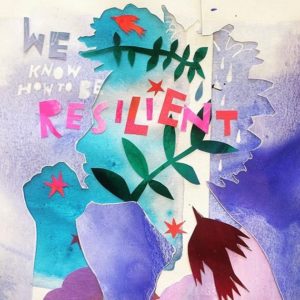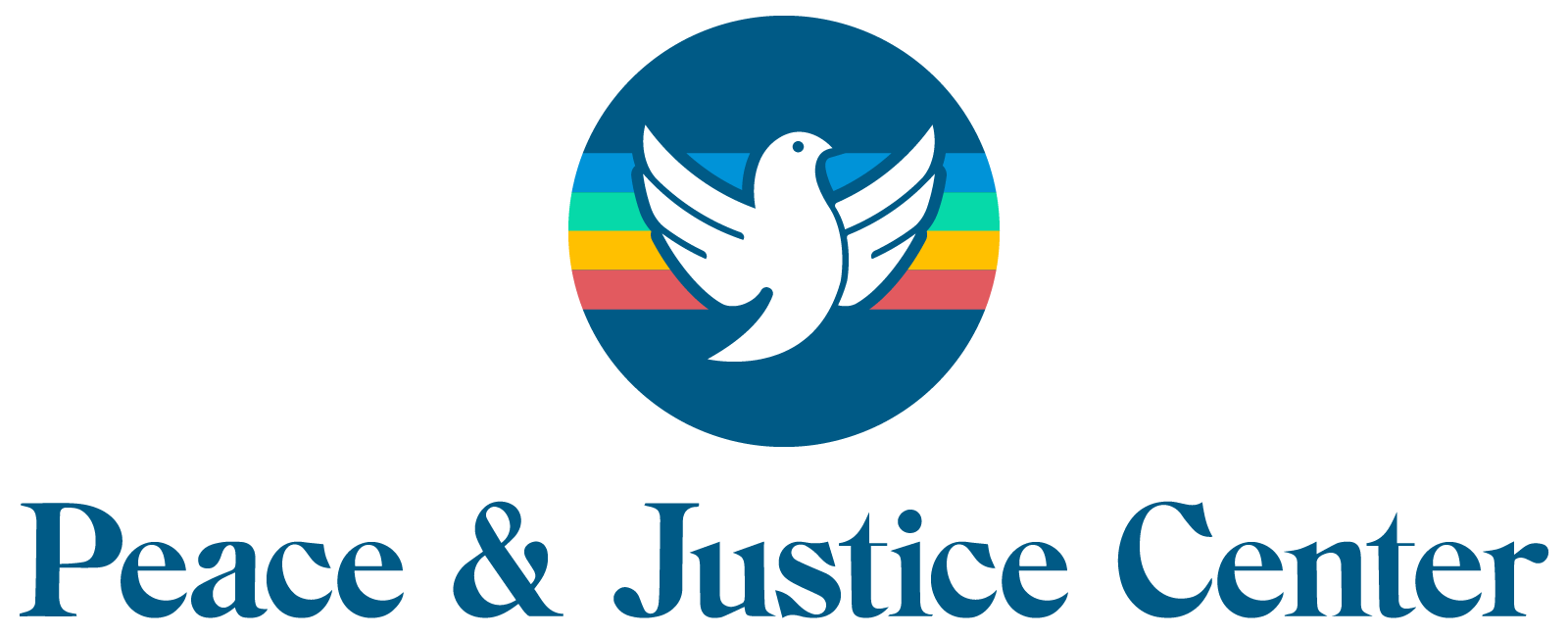– Leif Taranta, Emma Schoenberg (PJC Board Member), and Julie Macuga

We are organizers, strategists, direct action campaigners, who love community, resistance, collaboration, and living in what we call the “movement ecology” of Vermont. We’re the small group that built the beginnings of the statewide community safehouse network during the lead-up to the Nov. election. Some of the lessons we learned in that experience are represented here.
So, we wrote some thoughts down for our friends and comrades who are thinking about how to respond in this moment. Take it or leave it – we just couldn’t speak to all of it all so we wanted to try writing it down.
How we see the context of the moment we are in (just to situate ourselves):
- The militias/white supremacist groups planning these armed actions are best described as paramilitaries – armed right wing bodies that are ultimately aligned with the state (no matter how much they claim to be against it), and in strengthening/upholding facism (hence the collaboration between cops and the armed right wing groups, etc)…
- We are at a moment where the state and the paramilitaries appear to be in opposition, as the paramilitaries contest the 2021 inauguration. On the left, we will have to struggle against whoever is the “winner” of this very brief conflict, and ultimately against both groups (because they are in fact on the same team- the team of white supremacy).
- These next few weeks could be a time for mutual aid, community strengthening conversations, and to provide resources to those radicalized by this conflict. There might be a powerful, and perhaps transformational alternative besides putting ourselves in danger to protect the state (which is something we consider to be implied in actions protecting state capitols OR going head-to-head with paramilitaries in the next week, etc).
- We can be protecting our people and communities. Also noting here a potential conversation around who feels safest in “reactivity” — the three of us are currently reflecting on mobilizing from a place of reactivity and it’s potential for upholding a culture of whiteness. “Moving at the speed of trust” is a core organizing principle for us, especially in multi-racial organizing spaces. We are wondering if “reactivity” (which is not the same thing as mobilizing quickly) can come from a place of whiteness that assumes trust can be built faster, especially across lines of power and privilege, than it actually can. FYI: Leif, Julie, and Emma are all white people.
What we are thinking about the role of counter-protesting specifically on the days leading up to the inauguration (on January 20th – 9 days away from when we wrote this):
- White supremacist paramilitaries are the main focus of the 16th/17th/20th. This is different from the protests that we’ve played roles at in the past few months – where we countered white supremacists who were there to distract and steal attention. By allowing them to act against the statehouse, we allow the truth of their existence to be revealed to those who have been in denial. This is an opportunity for truth telling- (for example- Jan 6 was a realization point for many white liberals about the truth of this country). Deescalating/counter protesting this situation only serves to hide this truth and ultimately protects paramilitaries.
- The 17th is also a trap – there is evidence that right wing groups have been planting false posters to encourage leftists and liberals to all come to statehouses on the 17th.- They are looking to cause harm, and hoping to blame antifascists for any fallout.
- The paramilitaries are dangerous!- absolutely. That’s why our efforts could be spent right now building community safety networks to protect each other and especially our most vulnerable comrades in this situation. Here are some things that might be necessary:
- Building safe house networks and escape plans for those most vulnerable to political violence . The three of us are already working on that one and be in touch if you want to be a safehouse!
- Educating and training the many many people who are being radicalized by this situation and onboarding them into organizing work (Ex: Nonviolent direct action, street medic, de-escalation, etc.)
- Continuing and expanding mutual aid efforts
- Continuing to build community safety systems and alternatives to police
- Community organizing to prepare for resistance if the coup gets worse- through strikes, direct action, and other methods.
- There’s a threat of violence on the 17th! (and other days) – yes. That’s why we need to prepare. And preparing is different from counterprotesting. This is a time for people trained in specific community safety skills to be on alert and ready to intervene if people are targeted. This can include:
- Medic teams ready to help
- Trained deescalation teams on standby for if the paramilitaries leave capitol complexes and go into towns to hurt people
- Legal/human rights observers, copwatchers, and legal support available to document what happens
- Therapists/mental health workers ready to help vulnerable people cope with the trauma of what is happening
- Community healing/safe spaces for people to congregate (in person or online)
- Continuing mutual aid
- Note: for example one thing we could consider next weekend could be direct support for BIPOC and other marginalized workers at the statehouse complex- asking what needs they have and working together to meet them (though indirectly because pandemic or not the statehouse is closed on weekends) .
- Meeting community needs through food/healing/mutual protection also further draws out the difference between the left and the paramilitaries– it contrasts the complete disregard for human life against our own commitments to community care. In this way, it’s a really effective messaging strategy against those who attempt to paint “both sides as the same.” It also invites people who are alarmed by what is happening into organizing communities. In this way, we could potentially pull off a very effective counterprotest based in action and collective values — we can show that we are opposed to what’s happening, and make a real impact all at the same time, without putting ourselves in increased danger. In this sense, community care could be more powerful and transformational than martyrdom. (**ok ok, martyrdom is a loaded term but we couldn’t think of a better one at this moment.)
The idea of a movement ecology perspective in VT:
- We want to be part of movements here in VT that acknowledge the importance of building trust, care, collaboration while avoiding sameness and the pressure to make everybody agree on the right way forward (let’s be real – there is no one right way forward) and we think there’s an opportunity to that connection work now and at any time.
- Movement ecology: all different experiences, skills, etc have different values to the social movement fabric of Vermont. We’ve got risk-takers, direct action practitioners, alternative solution builders, medics, deescalators, advocates for racial justice and police abolition and human rights, etc. Not everyone or every organization has to do the exact same thing. We can be ultra-strategic and also get some relief from the idea that there are only two options for taking action – either completely autonomous groups or big-tent organizing. Specific roles and/or tactics and/or actions for individuals and organizations are OK as long as there is healthy information flow, some shared trust, a certain level of skill/support, a deep respect for consent, and some trust in the competency of white folks who are doing actions in a time where BIPOC perspective and safety is critical.
- We are mentioning this NOW and in THIS context of the upcoming week to start seeding the idea that all our speedy organizing right now can also be laying the groundwork for some of this.
- So, this time around, we could try and move at the speed of trust and no faster. Here are a few good questions to ask when evaluating actions with a movement ecology perspective:
- Who has been doing the work already?
- Who are the people who could be impacted by my/our actions?
- What is my/our particular role – what can I/we do that others are not already doing or how can I/we support what’s already going on?
- What can I give? What do I want to contribute that meets me at the place of my convictions?
- Where is there high-trust and where is trust low?
- How can my actions be opportunities to build trust?
Finally:
- We love all efforts and all choices! We pledge to support, listen, engage and be in radical fucking discernment about the huge levels of trust we want to (read : perhaps need to be) building so that we can do really powerful stuff in concert with one another.
- This is just one thread in a much larger fabric – obviously nothing in this document is the end-all-be-all of organizing and we know there is so much more going on that hasn’t been named. We are ok with offering just this slice of perspective. We don’t have to all be on the same page.
- The list of potential mutual aid and community defense projects could happen in small teams. Or we could get together next weekend and start working on these things! Or whatever the will is there to do – efforts can be autonomous, collaborative, and overlapping. At the moment, the three of us aren’t in any of the planning circles, and we are down to roll with whatever ends up happening in our community this week and be of service to the places where we can help keep each other safe and make friends.
- If people don’t have training in specific roles- that’s okay!!! We know that a lot of the things we’ve listed take certain trained skills – Leif and Emma are training-nerds and happy to work with people to support skilling up *any time*. And…lot of the next week is going to be a messaging battle that anyone can participate in. If you aren’t trained in a skill, now is a time to be explaining to people who are confused or misframing things the truth of what’s happening, and to be inviting newly radicalized people into our work. This is a hugely important role.
- In a few weeks we’ll have to fight both sides (which are of course the same side). Let’s fight for each other as we build the capacities to take care of ourselves, our friends, radicalize new comrades, and strengthen our communities.
That’s it! Thanks for reading. We are down to keep teasing this out all together! Reach out any time. We might change our minds about all of this as things continue to emerge.
[divider style=”e.g. blank, dotted, solid, double” padding_top=”0″ padding_bottom=”0″][/divider]
Leif Taranta leif.taranta@gmail.com
Emma Schoenberg: em.schoenberg@gmail.com
Julie Macuga juliemacuga@gmail.com
